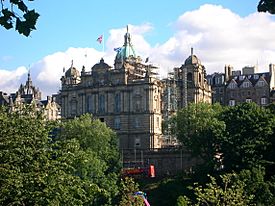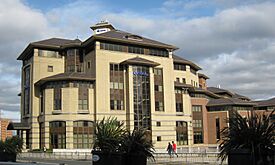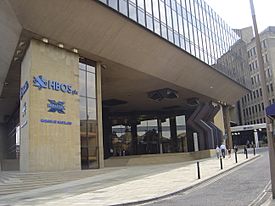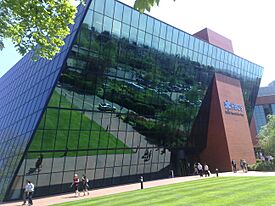HBOS facts for kids
 |
|
| Industry | Finance and Insurance |
|---|---|
| Fate | Acquired by Lloyds TSB |
| Founded | 2000 |
| Headquarters | |
|
Key people
|
James Crosby & Andy Hornby (former Chief Executives) Lord Stevenson of Coddenham (Chairman) |
| Products | Financial services |
|
Number of employees
|
72,000 |
| Parent | Lloyds Banking Group |
| Subsidiaries | Bank of Scotland plc, HBOS Australia, HBOS Insurance & Investment Group |


HBOS plc is a banking and insurance company in the United Kingdom, a wholly owned subsidiary of the Lloyds Banking Group, having been taken over in January 2009. It was the holding company for Bank of Scotland plc, which operated the Bank of Scotland and Halifax brands in the UK, as well as HBOS Australia and HBOS Insurance & Investment Group Limited, the group's insurance division.
HBOS was formed by the 2001 merger of Halifax plc and the Bank of Scotland. The formation of HBOS was heralded as creating a fifth force in British banking as it created a company of comparable size and stature to the established Big Four UK retail banks. It was also the UK's largest mortgage lender. The HBOS Group Reorganisation Act 2006 saw the transfer of Halifax plc and Capital Bank plc to the Bank of Scotland, which had by then become a registered public limited company, Bank of Scotland plc.
Although officially HBOS was not an acronym of any specific words, it is widely presumed to stand for Halifax Bank of Scotland. The corporate headquarters of the group were located on The Mound in Edinburgh, Scotland, the former head office of the Bank of Scotland. Its operational headquarters were in Halifax, West Yorkshire, England, the former head office of Halifax.
On 19 January 2009, the group was acquired by Lloyds TSB and became a subsidiary of Lloyds Banking Group after both sets of shareholders approved the deal.
Lloyds Banking Group stated that the new group would continue to use The Mound as the headquarters for its Scottish operations and would continue the issue of Scottish bank notes.
Contents
History
HBOS was formed by a merger of Halifax and Bank of Scotland in 2001, Halifax having demutualised and floated four years prior.
HBOS Group Reorganisation Act 2006
In 2006, HBOS secured the passing of the HBOS Group Reorganisation Act 2006, a private Act of Parliament that rationalised the bank's corporate structure. The act allowed HBOS to make the Governor and Company of the Bank of Scotland a public limited company, Bank of Scotland plc, which became the principal banking subsidiary of HBOS. Halifax plc and Capital Bank plc transferred its undertakings to Bank of Scotland plc.The Halifax brand name was retained, Halifax then began to operate under the latter's UK banking licence.
The provisions in the Act were implemented on 17 September 2007.
The share price peaked at over 1150p in February 2007.
2008 short selling and credit crunch
In 2004, Paul Moore, HBOS head of Group Regulatory Risk, warned senior directors at HBOS about excessive risk-taking. He was dismissed, and his concerns not acted on.
In March 2008, HBOS shares fell 17 percent amid false rumours that it had asked the Bank of England for emergency funding. The Financial Services Authority conducted an investigation as to whether short selling had any links with the rumours. It concluded that there was no deliberate attempt to drive the share price down.
On 17 September 2008, very shortly after the demise of Lehman Brothers, HBOS's share price suffered wild fluctuations between 88p and 220p per share, despite the FSA's assurances as to its liquidity and exposure to the wider credit crunch.
However, later that day, the BBC reported that HBOS was in advanced takeover talks with Lloyds TSB to create a "superbank" with 38 million customers. That was later confirmed by HBOS. The BBC suggested that shareholders would be offered up to £3.00 per share, causing the share price to rise, but later retracted that comment. Later that day, the price was set at 0.83 Lloyds shares for each HBOS share, equivalent to 232p per share, which was less than the 275p price at which HBOS had raised funds earlier in 2008. The price was later altered to 0.605 Lloyds shares per HBOS share.
To avoid another Northern Rock-style collapse, the UK government announced that should the takeover go ahead, it would be allowed to bypass competition law.
Alex Salmond, Scotland's First Minister, previously an economist, said of the takeover:
"I am very angry that we can have a situation where a bank can be forced into a merger by basically a bunch of short-selling spivs and speculators in the financial markets."
Acquisition by Lloyds TSB
On 18 September 2008, the terms of the recommended offer for HBOS by Lloyds TSB were announced. The deal was concluded on 19 January 2009. The three main conditions for the acquisition were:
- Three quarters of HBOS shareholders voted in favour of the board's actions;
- Half of Lloyds TSB shareholder voted to approve the takeover;
- UK government dispensation with respect to competition law.
A group of Scottish businessmen challenged the right of the UK government to approve the deal by over-ruling UK competition law, but this was rejected. The takeover was approved by HBOS shareholders on 12 December.
Prime Minister Gordon Brown personally brokered the deal with Lloyds TSB. An official said: "It is not the role of a Prime Minister to tell a City institution what to do". The Lloyds TSB board stated that merchant banks Merrill Lynch and Morgan Stanley were among the advisers recommending the takeover.
Lloyds Banking Group said Edinburgh-based HBOS, which it had absorbed in January, made a pre-tax loss of £10.8 billion in 2008. Andy Hornby, the former chief executive of HBOS, and Lord Stevenson of Coddenham, its former chairman, appeared before the Commons Treasury Committee to answer questions about the near-collapse of the bank. Hornby said: "I'm very sorry what happened at HBOS. It has affected shareholders, many of whom are colleagues, it's affected the communities in which we live and serve, it's clearly affected taxpayers, and we are extremely sorry for the turn of events that has brought it about."
Bailout
On 13 October 2008, Gordon Brown's announcement that government must be a "rock of stability" resulted to an "unprecedented but essential" government action: the Treasury would infuse £37 billion ($64 billion, €47 billion) of new capital into Royal Bank of Scotland Group Plc, Lloyds TSB and HBOS Plc, to avert financial sector collapse or UK "banking meltdown". He stressed that it was not "standard public ownership", as the banks would return to private investors "at the right time". The Chancellor of the Exchequer, Alistair Darling, claimed that the British public would benefit from the rescue plan, because the government would have some control over RBS in exchange for about £20 billion of funding. Total State ownership in RBS would be 60%, and 40% for HBOS. Royal Bank of Scotland said it intended to raise £20 billion ($34 billion) capital with the government's aid; its chief executive Fred Goodwin resigned. The government acquired $8.6 billion of preference shares and underwrote $25.7 billion of ordinary shares. Thus, it intended to raise £15 billion (€18.9 billion, $25.8 billion) from investors, to be underwritten by the government. The State would pay £5 billion for RBS, while Barclays Bank raised £6.5 billion from private sector investors, with no government help. Reuters reported that Britain could inject £40 billion ($69 billion) into the three banks including Barclays.
Investigation
In 2015, an investigation by the Prudential Regulation Authority and Financial Conduct Authority blamed the failure requiring the bailout on the bank's executives, as well as being critical of the Financial Services Authority (FSA), the then-regulator. A parallel investigation into the FSA's enforcement process concluded it was too late to fine responsible executives, but up to 10 former HBOS executives could be banned from the financial services industry.
Causes of failure were identified as follows:
- The board failed to instil a culture within the firm that balanced risk and return appropriately, and it lacked sufficient experience and knowledge of banking.
- There was a flawed and unbalanced strategy and a business model with inherent vulnerabilities arising from an excessive focus on market share, asset growth and short-term profitability.
- The firm's executive management pursued rapid and uncontrolled growth of the Group's balance sheet. That led to an over-exposure to highly cyclical commercial real estate (CRE) at the peak of the economic cycle.
- The board and control functions failed to challenge effectively the pursuit of that course by the executive management, or to ensure adequate mitigating actions.
- The underlying weaknesses of HBOS's balance sheet made the Group extremely vulnerable to market shocks and eventual failure as the crisis in the financial system intensified.
After putting the investigation on hold in 2013, in April 2017, the Financial Conduct Authority resumed its probe of "the way HBOS handled fraud allegations at its Reading branch".
On 21 June 2019, the Financial Conduct Authority fined the Bank of Scotland £45.5 million over its failure to report suspicions of fraud at its Reading branch which led to the jailing of six people. The authority said that the bank "risked substantial prejudice to the interests of justice" by withholding information. The fine was reduced by almost £20 million because the bank agreed to settle.
Advertising
Operations
HBOS conducted all its operations through three main businesses:
- Bank of Scotland plc
- HBOS Australia
- HBOS Insurance & Investment Group Limited
Bank of Scotland plc
Bank of Scotland plc was the banking division of the HBOS group, and operated the following brands:
United Kingdom
- Bank of Scotland
- Bank of Scotland Private Banking
- Bank of Scotland Treasury Services
- Birmingham Midshires
- Halifax
- Capital Bank plc (Formally North west securities)
- AA Savings (the same brand also used Bank of Ireland for some accounts)
- Halifax Financial Services (Holdings) Ltd
- Halifax Investment Fund Managers Ltd
- Halifax Share Dealing Limited
- Halifax Unit Trust Management Ltd
- Intelligent Finance
- Sainsbury's Bank (50%) – holding sold to J Sainsbury plc on 31 January 2014.
- The Mortgage Business (TMB)
- Blair, Oliver & Scott (Debt recovery)
- St James's Place Bank
International
- Banco Halifax Hispania – rebranded as Lloyds Bank International in 2010 and sold to Banco Sabadell in 2013.
- Bank of Scotland Corporate
- Bank of Scotland International – transferred to Lloyds TSB Offshore in 2012, which became Lloyds Bank International in 2013.
- Bank of Scotland Investment Services
- Bank of Scotland (Ireland), trading as Halifax since 2006 and closed down on 31 December 2010.
- Bank of Scotland, Amsterdam branch - trading as Lloyds Bank since 2013 (savings) and 2014 (mortgages).
- Bank of Scotland, Berlin branch
HBOS Australia
HBOS Australia was formed in 2004 to consolidate the group's holdings in Australia. It consisted of the following subsidiaries:
- Capital Finance Australia Limited
- BOS International Australia Ltd
On 8 October 2008, HBOS Australia sold its Bank of Western Australia and St Andrew's Australia Pty Ltd subsidiaries for approximately A$2bn to Commonwealth Bank of Australia.
The group's businesses in Australia were sold to Westpac in October 2013.
HBOS Insurance and Investment Group Limited
HBOS Insurance & Investment Group Limited manages the group's insurance and investment brands in the UK and Europe. It consisted of the following:
- St James's Place Capital (60%)
- Halifax General Insurance Services Ltd
- St Andrew's Group
- Clerical Medical
It also used to own UK investment manager Insight Investment Management Limited. The Bank of New York Mellon acquired Insight in 2009.
See also
 In Spanish: HBOS para niños
In Spanish: HBOS para niños



